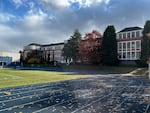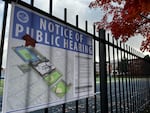After months of resisting district plans to relocate their students across town during the reconstruction of Jefferson High School, parents and community members in North and Northeast Portland appear to be getting what they’ve been asking for. Portland district officials agreed to back off initial plans to relocate students — in a move that could lead to major revisions to the project itself.

North Portland's Jefferson High School is the latest PPS high school to be slated for major renovations. The project is still in the planning stages.
Tiffany Camhi / OPB
Jefferson High School teachers, students and parents made their voices loud and clear at a meeting Monday and in previous sessions: they will not accept any renovation plans that move students offsite. And it appears that Portland Public Schools is listening. Some school board members and staff are pledging to stop moving forward with a previously announced Jefferson modernization plan that would have relocated the school’s students to the former Marshall High School campus about 11 miles away.
“I think it’s a good start,” said Jenn Latu, president of Jefferson’s Parent Teacher Student Association, of the district’s tentative decision to scrap plans that would move students. “I think this was a good opportunity for [the district] to show up.”
Over 100 community members from Jefferson’s surrounding North and Northeast neighborhoods, which includes Portland’s historically Black Albina neighborhood, came out to a town hall-style meeting called by PPS on Monday night. The education nonprofit Self Enhancement Inc. hosted the event.
Leaders from the PPS initiative, Center for Black Student Excellence, saw the meeting as a reset after the district’s summer announcement to move Jefferson students to Marshall received a loud backlash from students, teachers and parents. The district announced a pause in that plan last month, as initially reported by The Oregonian/Oregonlive.
Many people in the Jefferson community saw the plan to move students as a betrayal after previous district planning sessions led them to believe students would not have to be moved off campus during construction.
Repairing trust with the Jefferson community was top of mind for many PPS staff and some board members present at the meeting. Staff stressed clarity and transparency throughout the meeting, offering PowerPoint slides and informational handouts showing the district’s process so far. Others took accountability for miscommunications.
“There’s information that you missed over the summer,” said Camille Idedevbo, interim director at the Center for Black Student Excellence. “I wanna take a moment to acknowledge it. That was a misstep.”
The town hall became raucous at times, with some community members interrupting the meeting with questions on whether the district still planned to move students. Some brought up Lincoln High School — the recently rebuilt high school downtown, which was reconstructed without students being required to move off-site. Many community members were worried that moving Jefferson’s majority BIPOC students would ultimately hurt the community. Others were concerned that the move would hurt enrollment at the school.

A previous PPS plan that would have moved Jefferson students to another campus 11 miles away appears to have been scrapped. The plan received fierce backlash from Jefferson community members.
Tiffany Camhi / OPB
Part of the goal of Monday night’s meeting was to get specific feedback from the Jefferson community on the right path forward. District staff conducted live polls with people attending the meeting, both in person and remotely. One poll, with more than 100 participants, illustrated how unified the Jefferson community’s stance on the proposed modernization is. The poll asked if any plan that would move students off campus should be considered — 90% of respondents answered no.
Participants in the meeting also showed a strong preference to move forward with a new plan introduced by the district that would construct an entirely new building and demolish Jefferson’s historically designated building.
“People are not going to like that. I don’t like that,” said 16-year-old Jefferson junior Rula Garvin, who was surprised to learn of this new proposal the day after the meeting. “I was hearing about the modernization as a sophomore and [the district] told us they would keep the brick and update the inside and build onto the building.”
District staff say this plan, called “New North,” would cost the district more money than its original plan, require additional voter-approved bond funding, take about four years to construct and be subject to a potentially contentious review process through Portland’s Historic Landmarks Commission. It would set back the Jefferson modernization project by at least two years.
The district’s previous plan for Jefferson, which required students to move off campus, was an estimated three-year construction project that was slated to begin next year. Funding for the projected $300 million modernization was made possible by a $1.2 billion capital construction bond, approved by voters in 2020.
Now, with fresh feedback from a relatively small sample of the Jefferson community, the district is headed back to the drawing board. Any new plan for Jefferson must be approved by the PPS board. Board member Michelle DePass said she was encouraged to hear from the community and would take the feedback to the board for next steps.
“There’s gonna be some trade offs in terms of increase in costs because of the order in which we conducted the process,” DePass said. “We’re going to have to have a conversation as a whole board.”
DePass acknowledged that funding a different approach to Jefferson’s modernization would likely mean relying on voter support for a future bond.
“Right now, this week would not be a good time to put anything PPS on the ballot,” said DePass, nodding to the ongoing teacher strike. “It’s timing, being sensitive to other things that are happening in the community and communicating what the district is trying to accomplish.”
Meanwhile, many Jefferson community members said they want to be more involved in the renovation planning process and called for the district to create a comprehensive community engagement plan to be able to notify stakeholders of any coming meetings in several different ways.
“We need a commitment that when these big decisions that impact people in this community are made, they need to involve people in this community,” said Latu. “[Decisions] can’t be made without the people who understand the nuances, especially in a community like Jefferson where there is so much historical harm.”
